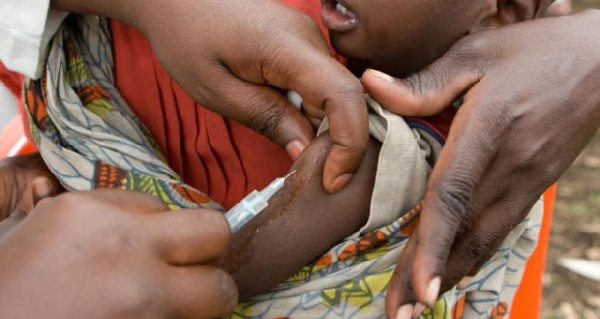
An estimated number of 7,883,188 children between nine months and under 15 years would be vaccinated against measles during this year's "accelerated measles control campaign" to effectively reduce the spread of the disease in the country.
The campaign, which will begin from December 9-15th, has targeted coverage of 95 percent in all the regions with the exception of Central Region which had already been covered.
Dr Mercy Ahun, Programme Manager of the Expanded Programme on Immunisation (EPI) of the Ministry of Health said this in Accra on Wednesday when she briefed the press on the campaign.
In all, about 25,000 health workers and volunteers would be at vantage points to participate in the exercise. The World Health Organisation (WHO), UNICEF, the Red Cross, United Nations Foundation, Centre for Disease Control (USA), the Japanese Government and the Government of Ghana are supporting the exercise.
She said measles was still a leading cause of illness among the vaccine preventable diseases in the country and major outbreak occurs every five years. Dr Ahun noted that measles, a major killer of children was ranked second to malaria 20 years ago. A germ called measles virus causes it.
Measles could be transmitted from one person to another when another person inhales droplets of moisture discharged from a patients' mouth through sneezing or coughing.
Dr Ahun said the disease could cause complications like ear and eye infections, sores in the mouth, pneumonia and even death if not treated. Two major outbreaks occurred in 1995 and 2000. About 43,177 cases and 85 deaths were recorded in 1995 with 15,173 cases in 2000.
The programme Manager said guidelines from WHO indicated that providing one dose of vaccine at nine months could not control measles and that an additional dose would only dramatically reduce the number of cases of measles and the number of deaths to almost zero.
"This is because at nine months, some children still have maternal protection from their mothers and this interferes with the vaccine". Dr Ahun appealed to parents to send their children for the vaccination even if they have been vaccinated already because there are no possible side effects if they should receive a double dose.
An estimated number of 7,883,188 children between nine months and under 15 years would be vaccinated against measles during this year's "accelerated measles control campaign" to effectively reduce the spread of the disease in the country.
The campaign, which will begin from December 9-15th, has targeted coverage of 95 percent in all the regions with the exception of Central Region which had already been covered.
Dr Mercy Ahun, Programme Manager of the Expanded Programme on Immunisation (EPI) of the Ministry of Health said this in Accra on Wednesday when she briefed the press on the campaign.
In all, about 25,000 health workers and volunteers would be at vantage points to participate in the exercise. The World Health Organisation (WHO), UNICEF, the Red Cross, United Nations Foundation, Centre for Disease Control (USA), the Japanese Government and the Government of Ghana are supporting the exercise.
She said measles was still a leading cause of illness among the vaccine preventable diseases in the country and major outbreak occurs every five years. Dr Ahun noted that measles, a major killer of children was ranked second to malaria 20 years ago. A germ called measles virus causes it.
Measles could be transmitted from one person to another when another person inhales droplets of moisture discharged from a patients' mouth through sneezing or coughing.
Dr Ahun said the disease could cause complications like ear and eye infections, sores in the mouth, pneumonia and even death if not treated. Two major outbreaks occurred in 1995 and 2000. About 43,177 cases and 85 deaths were recorded in 1995 with 15,173 cases in 2000.
The programme Manager said guidelines from WHO indicated that providing one dose of vaccine at nine months could not control measles and that an additional dose would only dramatically reduce the number of cases of measles and the number of deaths to almost zero.
"This is because at nine months, some children still have maternal protection from their mothers and this interferes with the vaccine". Dr Ahun appealed to parents to send their children for the vaccination even if they have been vaccinated already because there are no possible side effects if they should receive a double dose.